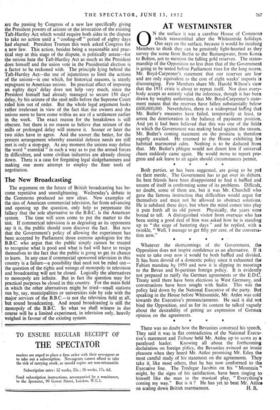The New Broadcasting
The argument on the future of British broadcasting has be- come repetitive and unenlightening. Wednesday's debate in the Commons produced no new ideas. New examples of the sins of American commercial television, far from advancing and opening up the question, only help to perpetuate the fallacy that the sole alternative to the B.B.C. is the American system. The time will soon come to put the matter to the test. If commerical television is as degrading as its opponents say it is, the public should soon discover the fact. But now that the Government's policy of allowing the experiment has been accepted by Parliament those extreme apologists for the B.B.C. who argue that the public simply cannot be trusted to recognise what is good and what is bad will have to resign themselves to the fact that the public is going to get its chance to learn. In any case if commercial sponsored television in this country is a failure—a possibility that need not be ruled out— the question of the rights and wrongs of monopoly in television and broadcasting will not be closed. Logically the alternatives to monopoly are infinite. But in fact the question may for practical purposes be closed in this country. For the main field in which the other alternatives might be tried—small stations run by, say, municipalities or universities side by side with the Major services of the B.B.C.—is not the television field at all, but sound broadcasting. And sound broadcasting is still the Monopoly of the B.B.C. So what we shall witness in due course will be a limited experiment, in television only, heavily weighed in favour of the existing system.


































 Previous page
Previous page